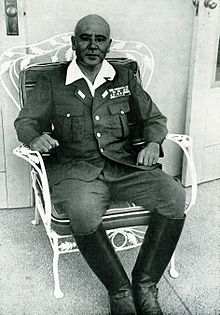Homma Masaharu
Homma Masaharu ( Japanese 本 間 雅晴 ; born November 27, 1887 in Sado , Niigata Prefecture , Japan ; † April 3, 1946 in Los Baños , Laguna , Philippines ) was a Japanese command officer in the imperial army , most recently in the rank of lieutenant general . After the end of World War II , he was executed for war crimes committed by the Japanese armed forces .
Life
Homma graduated in 1907 in the 14th class of the Army Officer School and in 1915 in the 27th class of the Army University . He spent several years as a military attaché at the embassy in London and during this time also took part on the Western Front in World War I , where he was attached to the East Lancashire Regiment .
In 1932 he was a participant in the Japanese delegation to the Geneva Disarmament Conference and then served in the press department of the Army Ministry . In 1933 he was given command of the 1st Infantry Regiment for two years and then took over the 32nd Infantry Brigade for one year. In 1937 he was adjutant of Prince Chichibu , brother of the emperor, with whom he undertook in the same year on a journey through Europe and the Nuremberg Nazi Party Rally of Adolf Hitler met. On his return he was appointed head of the 2nd Department of the General Staff.
Second World War
During the Second Sino-Japanese War , he was promoted to Lieutenant General in July 1938 and commanded the 27th Division with which he took part in the Battle of Wuhan . After the battle, he and his division were transferred to Tianjin , where he negotiated the foreign concessions during the Tianjin crisis. In 1940 he was transferred to Taiwan again, where he commanded the local army district until the beginning of the Pacific War.
Homma commanded the 14th Army in the Philippines from December 1941 to August 1942. Under his leadership, the Japanese conquered the island kingdom and accepted the surrender of the Philippine and American forces. He subsequently ordered the evacuation of the peninsula Bataan , so that the Bataan Death March came. Shortly thereafter, he was relieved of his command and transferred to the reserve. The reason for this was the high cost and the long duration of the campaign, which was attributed to its clumsiness.
He is not described as a fanatical militarist , but as a compassionate, moderate person with a weakness for everything English. Due to his partly Western training - Homma was at various military academies and in Oxford - he was globally oriented. So he loved acting and had a penchant for American films. He was friends with many Japanese artists and writers. Since he painted a lot and had a habit of writing poetry during battles, he was also called the Poetic General .
His military strength lay in his theoretical knowledge and the development of various strategies . On the other hand, the weak point of his person was the underdeveloped leadership style and the failure to observe the everyday feasibility of his commands. As a result, his subordinates treated the Filipino and American prisoners of war brutally, although Homma repeatedly stressed that they were treated fairly and decently. His leadership style was weak and careless.
Trial and Execution
After the Pacific War ended, Homma Masaharu and General Yamashita Tomoyuki were sentenced to death in Manila for war crimes against Allied prisoners and the bombing of Manila after it was declared an open city .
His conviction remained controversial. The US judge Frank Murphy criticized the fact that Homma was not given an opportunity to appeal and found the verdict to be inconsistent with the rule of law. John H. Skeen, Jr., Homma's defense attorney, said the verdict was pre-determined and there was never any chance of a fair trial. General Douglas MacArthur, however, wrote: "If this defendant did not deserve death, no one in the history of the death penalty would have deserved it. Homma insidiously killed civilians who did not play any military role.
Despite a plea for mercy , the Hommas woman wrote to General MacArthur, the verdict on April 3, 1946 at 00:53 was - exactly four years after he had given to the 14th Army command to attack the Philippines - in military prison Los Baños, 35 km from Manila, carried out. Unlike most other Japanese officers sentenced after the war, who were hanged in prison clothing, Homma was allowed to wear uniform and was shot dead .
Trivia
Dutch director Paul Verhoeven started making a film about the life of Homma Masaharu based on the book A Trial of Generals by Lawrence Taylor . The shooting was canceled in 2005, however, and director Fred Schepisi took over the further preparations from January 2007. The working title of the unfinished film project was Beast of Bataan .
literature
- Lawrence Taylor: Homma, Yamashita, MacArthur. Icarus Press, 1981, ISBN 0-89651-775-6 .
- Aubrey Saint Kenworthy: The Tiger of Malaya: The story of General Tomoyuki Yamashita and "Death March" General Masaharu Homma. Exposition Press, 1951.
Web links
- Biography (french)
Individual evidence
- ↑ Application of Homma, 327 US 759 (1946)
- ↑ (Toland, p. 320)
- ^ Occupation of Japan, 1945-1950, MacArthur, Reminiscences, Bluejacket Books, Naval Institute Press, 1964
| personal data | |
|---|---|
| SURNAME | Homma, Masaharu |
| ALTERNATIVE NAMES | 本 間 雅晴 (Japanese) |
| BRIEF DESCRIPTION | Japanese command officer |
| DATE OF BIRTH | November 27, 1887 |
| PLACE OF BIRTH | Sado , Japan |
| DATE OF DEATH | April 3, 1946 |
| Place of death | Los Baños , Philippines |

